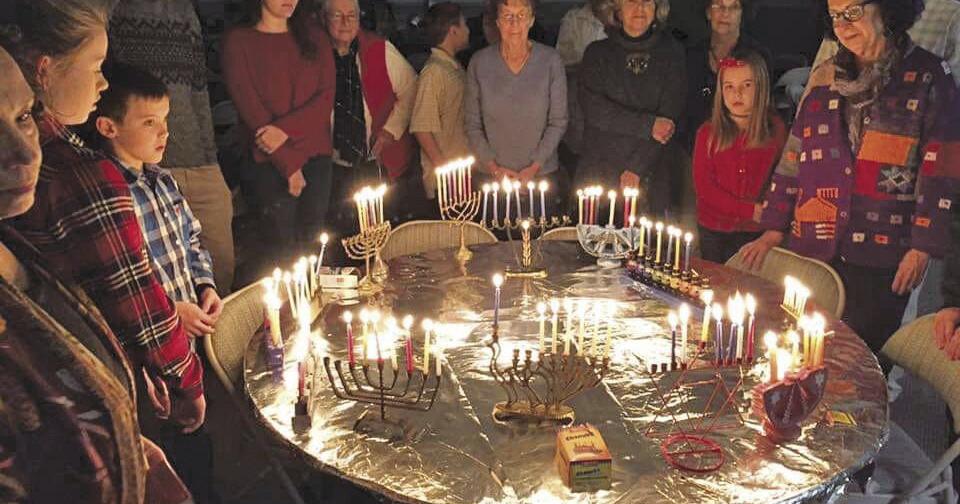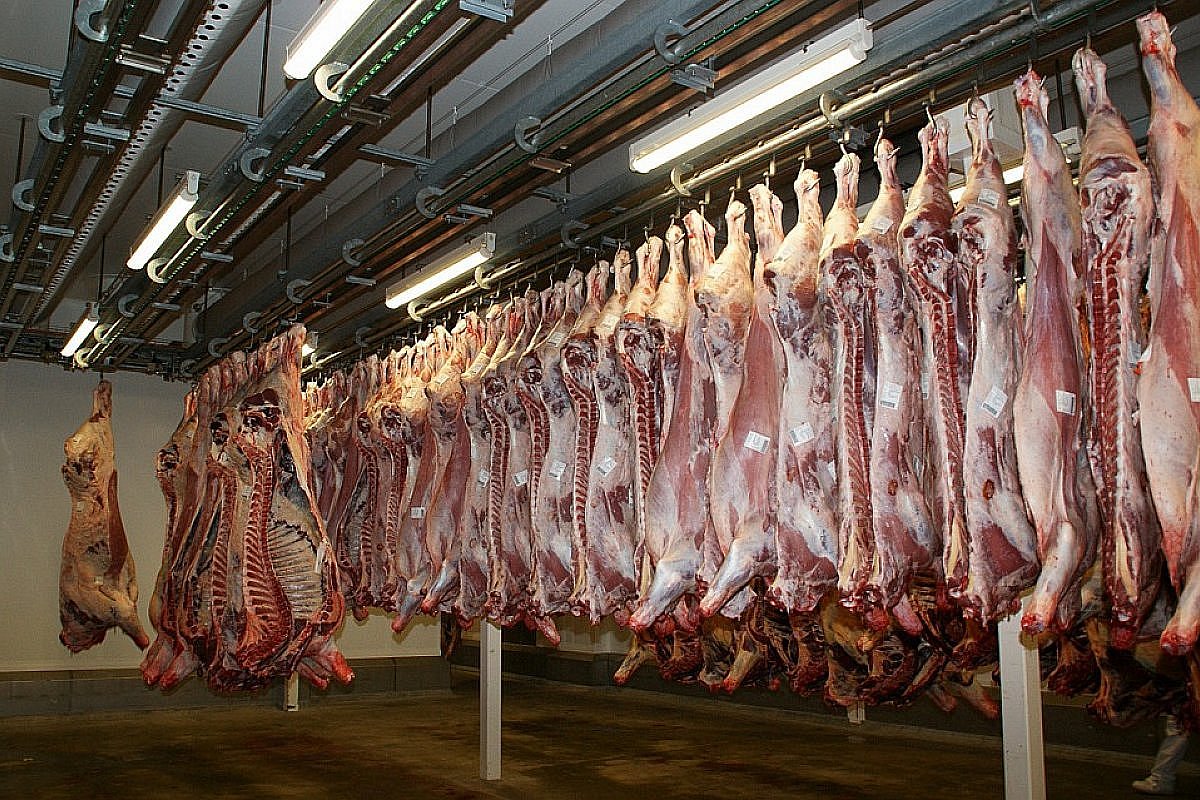Sorry, an error occurred.
Members of Temple B’nai Israel in Laconia celebrate Hanukkah several years ago. (Courtesy photo)
Members of Temple B’nai Israel in Laconia celebrate Hanukkah several years ago. (Courtesy photo)
It’s that time of year again, when little children anticipate the joy of presents, preparing and eating delicious foods, visits with family, and singing familiar songs. You may think I’m referring to Christmas, but the festival of Hanukkah is being celebrated in Jewish homes around the world this week. Hanukkah began this past weekend on Saturday, Nov. 28, and is being observed for eight days until sundown Monday, Dec. 6. You may be asking yourself — what? It’s Hanukkah? Doesn’t that happen as the same time as Christmas? Why eight days? What is Hanukkah anyway? According to Rabbi Dan Danson of Temple B’nai Israel, “Hanukah is a wonderful Jewish holiday, an island of light on a dark winter’s night, filled with food and games that bring cold evenings to life. Its message of freedom, courage, and religious integrity continues to inspire.”
The Jewish festival of Hanukkah celebrates the victory of the Maccabees over the Greeks. Approximately 2,200 years ago there was a war. The Greeks occupied the city of Jerusalem and the Holy Temple of the Jewish people. The Greeks forced their culture on the Jews. A group of Jewish warriors, the Maccabees, revolted and liberated Jerusalem. When the Maccabees took possession of the Temple they found it had been defiled and used to worship the pagan god Zeus. The Temple was rededicated by relighting the holy menorah whose source of fuel was olive oil. The Maccabees only found a single jar of undefiled oil, and that oil was only enough to last a single day. They took a leap of faith, relit the menorah and, to their surprise, the menorah stayed lit for eight days. This miracle is why Hanukkah is an eight-day celebration commemorating each day the oil lasted. The Hebrew word Hanukkah means rededication and is spelled many different ways in English, depending on who does the translating.
The celebration of Hanukkah, also referred to as the Festival of Lights, is observed in Jewish homes, not in the synagogues, by lighting the family menorah(s) while chanting blessings.
This happens every night of Hanukkah beginning in the evening at sundown with the lighting of the menorah (a candleholder with nine branches). The nine branches hold eight candles representing the eight days the oil lasted and one for a candle used to light the others. Hanukkah is considered a minor holiday when compared to Rosh Hashanah and Yom Kippur, which mark the time of renewal and repentance, or Passover, which commemorates the Jews’ escape from Egypt. But Hanukkah underscores one of the most significant themes in Jewish history: the struggle to practice Judaism when powerful forces seek to extinguish it.
So, why isn’t Hanukkah on the same day every year? It is. It’s just that it’s the same day every year on the Hebrew calendar, which is a lunar calendar, as opposed to the solar, 365-day calendar where you can count on Christmas falling on Dec. 25. The only connection between Christmas and Hanukkah is that they are usually celebrated at the same time of the year. Traditionally, children received money from parents and relatives at Hanukkah which is referred to as Hanukkah gelt (Yiddish for coins). When Hanukkah came to be celebrated in the U.S., parents began to give their children Hanukkah gifts instead, although Hanukkah gelt has survived in the form of chocolate coins.
From the time I was a little girl, Hanukkah was filled with anticipation and excitement. I remember many special gifts that I received including my very first Barbie doll. In my childhood home gifts were exchanged only on the first night of Hanukkah but we lit our menorah and sang the blessings every night. In addition to the traditional candlelit menorah, we also displayed an electric menorah in the front window. It was my job to turn on the electric menorah and light the right number of bulbs. My mother was a latke maven, or potato pancake expert. Her latkes were light and crispy, always served with homemade applesauce, alongside a brisket.
I have carried these traditions with me and shared them with my children — two menorahs, one for the window and one with glowing candles, crispy latkes, brisket — but I created a new tradition by giving a gift for each night of Hanukkah. Wrapped presents sat lined up in front of the fireplace. Each child could see their own line-up but had to select just one each night, after the menorahs were lit.
Many years later I am still celebrating Hanukkah with my family, which now includes my Temple B’nai Israel “family” here in Laconia. I had an immediate connection with this small but dynamic congregation that has been here for over 80 years, and for the last 25 years has hosted a Jewish Food Festival that is widely attended and supported by the Lakes Region community and beyond. Although I considered myself accomplished when it came to preparing the typical foods for my family holiday gatherings, I have learned new techniques and recipes for many of the foods that are the staples of the New Hampshire Jewish Food Festival, including the popular potato latkes.
When we talk about traditional foods that are prepared for the Hanukkah festival, potato latkes are at the top of the list. Why is this so? The simple answer is because they are fried in oil, symbolizing the miracle of the oil that lasted eight days. In the Middle Ages, Jews in Italy ate cheese pancakes during Hanukkah. In the shtetls of Eastern Europe, potatoes were readily available and inexpensive, and became the key ingredient in latkes. The latke recipe used for the food festival comes from TBI member Sue Needleman’s grandfather, Nathan Weitzler. If there’s a secret to getting latkes right, it’s straining out extra liquid, a vital step in this family recipe, which includes carrots, an ingredient not typically found in latkes.
My grandfather arrived on a steamer ship from Eastern Europe as a young boy with his siblings and parents. I don’t know if his mother added carrots or whether it was his own idea. He lived in Medway, Massachusetts and had a large vegetable garden and it is probable that he used carrots that he grew himself. I remember him grating the carrots, onions, and potatoes by hand. They were the best latkes I ever tasted! — Susan Needleman
LATKE RECIPE
makes approximately 25 latkes
Ingredients
6 baking potatoes
3 carrots
3 medium onions
4 large eggs
1/4 cup all-purpose flour
18 fl oz. vegetable oil
Directions
Place 2 unpeeled potatoes that have been washed, dried, and cut into quarters into a food processor. Pulse to shredded consistency. Pour into salad spinner and spin the liquid out of the potatoes. Remove potatoes to a large bowl or pot. Remove liquid from salad spinner. Continue until all potatoes are chopped. Peel carrots and cut into quarters. Pulse to shredded consistency. If there is liquid from the carrots, spin in salad spinner and add carrots to potatoes. Peel onions and cut into quarters. Pulse to chop. Put onions in salad spinner to remove liquid and add onions to the potatoes and carrots. Add 4 beaten eggs and mix evenly. Stir in 1/4 cup of all-purpose flour and combine evenly. Heat vegetable oil in large frying pan at medium heat. Using a large spoon with a bowl roughly 4 by 2.5 inches (or a 1/4 cup measuring cup), place latke mixture into hot oil. Press down slightly if needed. Fry until golden brown and turn over. Fry the other side until golden brown. When each latke is done, remove to a cooling rack placed over brown paper (open brown grocery bags — or use paper towels). To freeze: Cool completely and freeze single layers with wax paper in between each layer in large, covered aluminum pans.
The Talmud, Judaism’s book of laws, decrees that during Hanukkah there is to be no grieving, and no fasting. No problem if the latkes are good and plentiful. Happy Hanukkah to all who celebrate!
Your comment has been submitted.
Reported
There was a problem reporting this.
Log In
Keep it Clean. Please avoid obscene, vulgar, lewd, racist or sexually-oriented language.
PLEASE TURN OFF YOUR CAPS LOCK.
Don't Threaten. Threats of harming another person will not be tolerated.
Be Truthful. Don't knowingly lie about anyone or anything.
Be Nice. No racism, sexism or any sort of -ism that is degrading to another person.
Be Proactive. Use the 'Report' link on each comment to let us know of abusive posts.
Share with Us. We'd love to hear eyewitness accounts, the history behind an article.
Click Below To Read Today’s e-Edition!
Success! An email has been sent to with a link to confirm list signup.
Error! There was an error processing your request.
Would you like to receive a link to the Laconia Daily Sun online eEdition and preview the top stories? Now includes Court & Cops on Mondays!
With all the supply chain disruptions happening this year, how will that affect your holiday shopping plans?
Get up-to-the-minute news sent straight to your device.




